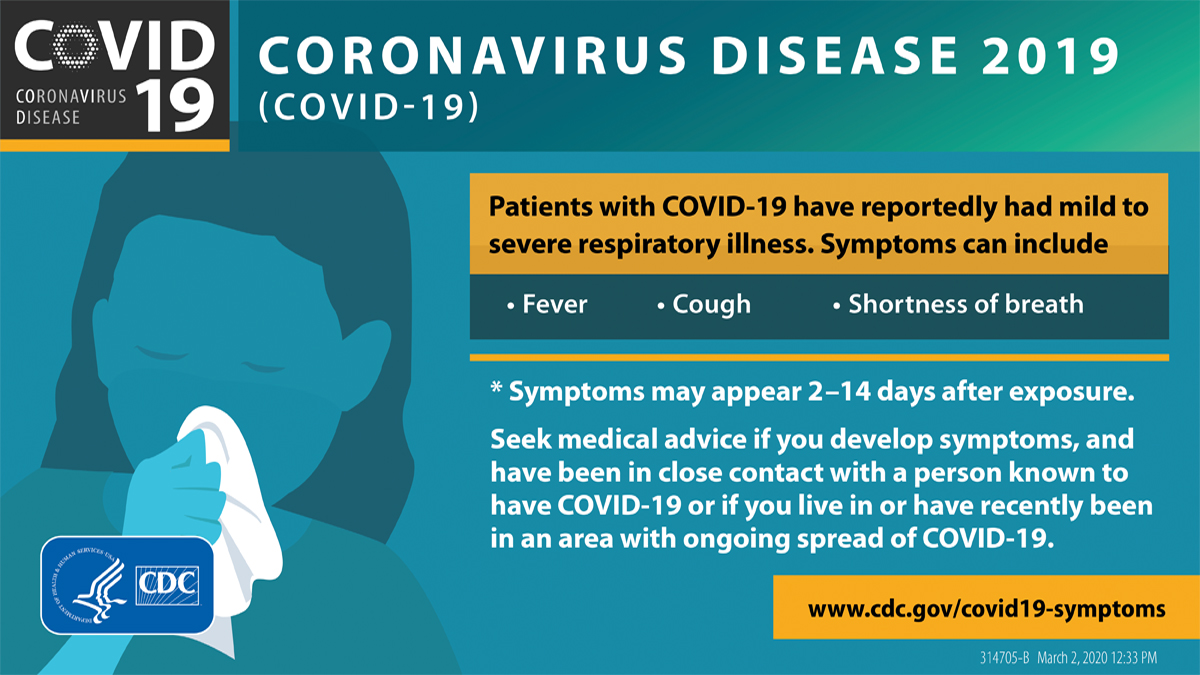COVID-19
Quick Links
- DIRECT PAYMENTS: Frequently Asked Questions on 3rd Round of Stimulus Checks
- UNEMPLOYMENT COMPENSATION: Expansion of Unemployment Benefits
- DIRECT FUNDING: State and Local Governments
- EXPANDED CHILD TAX CREDIT: How it Works
- EXPANDED INCOME TAX CREDIT: For Workers Without Children
- BLACK FARMERS DEBT RELIEF
- ACA TAX SUBSIDIES
- EMERGENCY RENTAL ASSISTANCE
- FOOD ASSISTANCE
- SMALL BUSINESSES: Available Resources
- NONPROFIT ORGANIZATIONS
- EDUCATORS AND STUDENTS
Background on COVID-19
COVID-19 is a respiratory disease caused by a new strain of coronavirus. COVID-19 was first detected in China and has spread to other countries, including the United States. As of March 2021, the United States has over 30 million confirmed cases of the coronavirus, and Alabama has over 515,000.
Risk of exposure to COVID-19
Symptoms of COVID-19
If you are feeling ill, please contact your doctor for guidance.
As of March 20, 2020, the ADPH is recommending that anyone showing symptoms should first call their healthcare provider. If you do not have a healthcare provider, please call 1-888-264-2256.

Preventing the Spread of COVID-19
There is currently no vaccine for COVID-19, and there is no specific treatment for the virus. In most cases people with COVID-19 will recover on their own. However, the CDC recommends everyday preventative actions to help prevent the spread of respiratory diseases including COVID-19:
- Practice social distancing
- Avoiding close contact with people who are sick
- Avoiding touching your eyes, nose, and mouth
- Staying home if you feel sick
- Covering your cough or sneeze with a tissue, then immediately dispose of the tissue in the trash
- Cleaning and disinfect frequently touched objects and surfaces (doorknobs, refrigerator door handles, etc.) with regular household cleaning sprays or wipes
- Washing your hands often with soap and water for at least 20 seconds (if soap and water are not available, use an alcohol-based hand sanitizer with at least 60% alcohol)
- If you are not sick and have yet to receive the current flu vaccine, get the current flu vaccine
The CDC does not recommend that people who feel healthy and well wear a facemask to protect themselves from COVID-19. Facemasks should be used by people who show symptoms of COVID-19 to help prevent the spread of the disease to others, or used by health workers and people who are taking care of an ill person in close settings such as at home or in a health care facility.
Alabama State Resources
For general COVID-19 questions, call 1-800-270-7268 or email covid19info@adph.state.al.us. Telephone calls are answered from 7 a.m. to 9 p.m. daily. Also visit ADPH’s FAQ page. For seniors, information is available at (334) 242-5743 or 1-877-425-2243.
Small Business PPP Loan Resources
Community Lenders to assist your businesses when applying for a PPP loan.
- Hope Credit Union | 1-866-321-4637
- Alabama Small Business Development Center | 1-877-825-7232
- Birmingham Business Resource Center | 205-250-6380
Mental Health Resources
Crisis counseling is available Nationwide to all residents of the United States through the U.S. Department of Health and Human Services’ Substance Abuse and Mental Health Services’ (SAMHSA) Disaster Distress Helpline by calling 1-800-985-5990 or text TalkWithUs to 66746. Spanish speakers may call 1-800-985-5990 and press "2" or text Hablanos to 66746 from all 50 states.
Those who are deaf or hard of hearing, use may use a preferred relay service to call the Disaster Distress Helpline at 1-800-985-5990 or TTY 1-800-846-8517.
For additional information on the Disaster Distress Helpline, please visit SAMHSA Disaster Distress Helpline.
Can my child still get school meals during closures?
State Superintendent Eric Mackey has said that students who receive free or reduced-cost lunches will still be provided meals through schools during the closure. Between now and when schools are reopened, click here to find a meal site near you.

In addition to providing meals for children, our local food assistance providers will continue to operate, providing meals to those in need.
- Greater Birmingham Ministries will be continuing uninterrupted service to Jefferson County.
- The West Alabama Food Bank will be continuing uninterrupted service to Bibb, Greene, Hale, Pickens, Sumter and Tuscaloosa counties.
- The Community Foodbank of Central Alabama will be continuing uninterrupted service to Jefferson County.
- The Edmundite Missions will be continuing uninterrupted service to Selma, Alabama.
- A list of food pantries in Tuscaloosa, Alabama, can be found here.
Avoiding Scams
The Treasury Inspector General for Tax Administration (TIGTA) has created a page on its website for individuals to learn about and report coronavirus scams.
